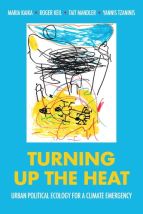Turning Up the Heat: Urban Political Ecology for a Climate Emergency

Our current climate emergency is unfolding within the context of extended urbanization, and the disconnection between theory and policy and politics of climate change has urgent socio-ecological implications. The editors of Turning Up the Heat declare that Urban Political Ecology (UPE) scholarship cannot ignore these implications and through this volume aim to set out an integrated UPE agenda that is better suited to address these contemporary environmental issues.
Turning Up the Heat is therefore a pertinent contribution to UPE scholarship as it brings together a diversity of authors (from the global North and global South) to discuss theory and praxis in relation to what role urbanization could and should play in addressing socio-environmental equality within the context of climate change and related rifts. The volume is also a valuable literature to anyone: policymaker, practitioner or layperson, who wants to unpick further the nuances of the ‘urbanization of nature’ and ‘extended urbanization’, the role of past and present socio-economic factors and place in urban inequalities, and their significance for addressing our current climate emergency.
This volume is set within the past twenty years of UPE scholarship which focused on the interdependence between ‘ecological’ and ‘urban’, where urban is less defined by place and more a process of continuous socio-ecological flows and transformations. It is also set within the current concern of the ‘urbanization of nature’ – as mentioned above – which symbolizes the ways nature is mobilized, commodified, metabolized/transformed in order to sustain a continuous process of urbanization. The editors depict both past and recent UPE scholarship as “fruitful and central to placing UPE in a unique position to address urgent political questions around climate change” and carry this through their book.
The editors share that the purpose of this volume is two-fold: 1) to allow comparison and contrasting of how distinct debates address current socio-environmental challenges, and 2) – and for them most importantly – to open dialogue among these debates over what UPE scholarship can offer to the politics of climate change and how it can move into debates around urbanization and climate change. Through Turning Up the Heat they also seek to encourage a better focus on southern urbanisms, the diversity of urban environments and neglected actors, grassroots practice, marginal spaces and alternative socio-environmental arrangement, and for UPE to move beyond the human life world.
To achieve this, Turning Up the Heat is structured in four main parts along with an introduction and epilogue. These parts represent four key debates that the editors recognize within the contemporary UPE agenda as important elements that need to be brought into generative dialogue to tackle the climate emergency. Authors from around the world contribute chapters to these four parts and all 18 chapters embrace the tension between critique and call for action at differing scales and geographical locations. Furthermore, each chapter can be read alone as a standalone article or can be read together as part of the volume’s narrative.
Part 1 sets out the first debate, which is how UPE can be strengthened through new ontologies of ‘the urban’ and debates over ‘extended urbanization’, ‘suburbanization’ and a critical take on ‘planetary urbanization’.
The debate in Part 2 calls for a situated UPE from scholars both working on or living in the global South, as well as from feminist and intersectional UPE scholars in order to inform theory with a broader range of urban experiences.
The third debate in Part 3 examines the challenges of bringing more than human actors and entanglements into UPE and the climate change agenda. It also illustrates how cities are produced by external socio-natural metabolic flows, and how the process by which non-human natures are urbanized is strongly influenced by socio-political contexts and spatial configurations.
Part 4 sets out the final debate, which is how UPE can contribute to contemporary environmental policy and politics in light of the existing disjuncture between policy, politics and academic debates. Within this it also discusses the links between racial capitalism, class struggle, and the politics of climate change and the need to integrate politics and social debate.
To conclude, the editors consider in their Epilogue whether or not an integrated UPE research and policy agenda is possible.
Book note prepared by Hannah Lee.
Search the Book notes database
Our Book notes database contains details and summaries of all the publications included in Book notes since 1993 - with details on how to obtain/download.
Use the search form above, or visit the Book notes landing page for more options and latest content.
For a searchable database for papers in Environment and Urbanization, go to http://eau.sagepub.com/

